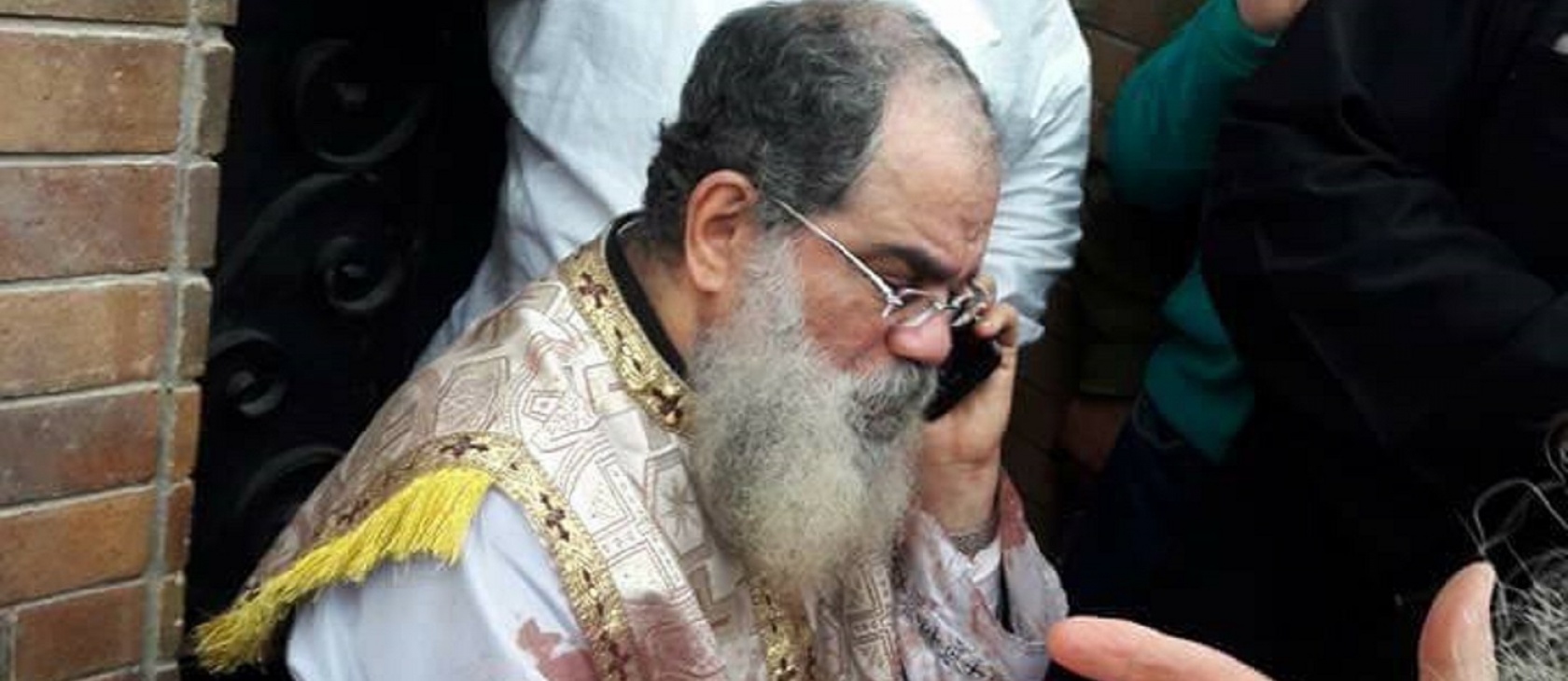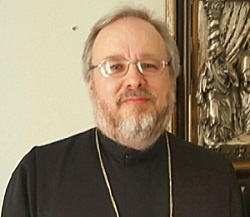As I was about to begin celebrating the Divine Liturgy of Palm Sunday in the Coptic church I was serving in Great Britain, the first news of the terrorist attack on a church in Tanta, Egypt, started to filter through. Almost as soon as the news started to appear on the BBC website, it seemed that another bombing was being reported at the Cathedral in Alexandria where Pope Tawadros II, the leader of the Coptic Orthodox Church, had been praying. The festive atmosphere became rather sober our congregation. Just a few minutes later I received a text message from a friend here in the UK, who had lost a close relative in the bombings that morning. The news was not simply affecting fellow Christians far away, but was an attack on the members of my own church, and had painfully and personally touched even those well known to me.
The Coptic Orthodox community in Egypt represents the indigenous population of Egypt. Indeed, the Coptic language often used in worship, is simply the last form of the language used by the Pharaohs. The modern Coptic Orthodox Church is proud of her history of perseverance in difficult circumstances more than 1,400 years since the Islamic invasion of Egypt. It is in that context that this faithful and committed community responds to an event like Sunday’s double bombing. There has not been a century in which the Copts have not been required to remain steadfast in their Christian faith, even to the point of death.
There is pride within the Coptic Orthodox community in those who have been martyred. This does not deny the grief in loss or the anger that such acts of violence have taken place. But it does mean that death at the hands of wicked men is not considered a cause for despair. At the service held just a day later by the bishop of Tanta, under whose own throne a bomb had been placed, there were tears – but there were also shouts of joy and applause for those who had died. Should it be so surprising to those in the West that a community who teaches that death is not the end of life might actually believe it?
What does a minority community facing the continuous threat of violence need from us?
It is moving to see how the Coptic community responds to such events, though they are becoming all too common. There have been prayers offered for the perpetrators, as well as the victims. There have been expressions of forgiveness even for the bombers themselves. There is even a sense that those who would plan and perform such things are most worthy of pity. After the bombing in December 2016, in which 24 Christians died at the Coptic Orthodox Cathedral in Cairo, UK Coptic Bishop Angaelos said, “We are ready to and we already have forgiven people for doing this.” And just a few days after this latest act of violence Father Angelos Sarkis, a priest for many years at the church that was bombed in Tanta who is now serving a Coptic church in Seattle, said to his congregation and to the local media, “We forgive those who did this. They don't know what they're doing.”
But there are also demands that the Egyptian government do more to protect Christians in Egypt. The Christian community considers itself to be no less Egyptian than members of any other religion, and therefore deserving of the same protections offered to other citizens. The terrorism which the Coptic community faces is not usually organised outside of Egypt, but is rooted in domestic politics which often place Christians in a difficult position.
I have also seen a sadness that the bombings in Egypt on Palm Sunday seem not to have generated as much interest in the media as many other recent terrorist attacks outside Egypt. It’s never wise to start comparing coverage, but for many people, things that happen in Egypt are just a violent background to more significant events in the Western world. The Mail on Sunday seemed not to have noticed the bomb attacks on churches in Egypt, but did seem to think that the pending separation of Janet Jackson from her husband was very important indeed. But the Coptic Orthodox community is not just over there somewhere in the Middle East. It is over here, in the West, and has a population of perhaps two million outside Egypt. There might be a Coptic Orthodox church in your town or city, and it is likely that some, at least, in each congregation, have been personally and directly affected by this tragedy, if not by one of the other bombings and terrorist attacks of recent years.
What does a minority community facing the continuous threat of violence need from us? How do we persevere through increasing terrorist attacks directed against all of us, either in the Middle East or the West? An expression of the concern of the wider community for Christians in the Middle East still raw from the immediate experience of violence – even as little as a leaving a word of consolation and support on social media – would mean a great deal.
It surely also means increasing our awareness of the conditions faced by Copts in Egypt, and other Christian minorities throughout the Middle East. It helps to liberate us from the notion that there is only an undifferentiated Muslim presence in these countries. In fact, in Egypt and Syria, the minority Christian communities are not recent migrants, but remnants of the original Christian population.
Immigration, and a globalised world, means that even when an atrocity takes place in another country we are often very close to those who are personally affected.
There will be different practical needs facing congregations who are trying to support a continuing migration of Coptic Orthodox out of Egypt into the West. Offering a helping hand in practical ways means a great deal more than hashtags and social media posts. The best way to discover what these needs are is simply to contact local Coptic community leaders and ask. The very act of asking will itself be an encouragement to those who have had to leave behind everything that is familiar for a better life in a new land. Help may be useful in finding schools and housing, gaining permission to work, and learning the language. In this respect the Coptic Orthodox community is no different than most other minority communities.
Most Coptic Orthodox Christians remain in Egypt, of course, and do not wish to leave their own country. The recently bereaved will be cared for, but there are millions of others who face poverty and discrimination because of their faith. It is a long-term problem, not one easily and quickly resolved. However, there are several agencies helping the Coptic community in their ancestral homeland, which are largely funded by Western supporters.
BlessUSA is an official Coptic charity and funding raised goes directly to the Coptic community. St. Marks Universal Copts Care, a UK-based organisation supporting the Coptic community, lists many other charitable agencies working for this community on their website. Most of these programs are intended, not simply to provide immediate and emergency support but to make a lasting difference to the Christian community in Egypt. For instance, Coptic Orphans provides a small income to families who have lost a father. One of its distinguishing characteristics is that it provides for the education of young girls and women, helping them to escape poverty. It is working with more than 10,000 girls and young women, both Christians and Muslims, especially in rural and poor areas of Egypt. Metropolitan Bakhomious, the second most senior bishop in the Coptic Orthodox Church, commends this organisation.
The charities serving Coptic Christians are few and poorly funded compared to the charitable organizations of other faiths. Generally, the Coptic Orthodox are standing alone in supporting the poor and uneducated, those facing discrimination and obstacles to social mobility.
Such terrorism is no longer a phenomena affecting only those far away. In Stockholm and Westminster the same wicked ideology led to death and destruction of innocent people. But immigration, and a globalised world, means that even when an atrocity takes place in another country we are often very close to those who are personally affected; indeed, we may be the ones affected ourselves. In Egypt, the target is not indiscriminate. The Coptic Orthodox community has been deliberately chosen and is bearing a sustained assault. Now, more than any ever, a word of encouragement and consolation, a gesture of practical and financial support, makes all the difference. It is a real expression of the sense that the Body of Christ – and people of goodwill in all faiths – must stand together to resist this global threat to liberty and democracy. If we will not remember and support the Copts, and the other minorities who bear this threat today, then who will remember us when we are left to bear it alone.
(Article photo credit: History of the Copts Facebook page.)
(Homepage slider photo credit: Coptic Orthodox Diocese of Melbourne)




